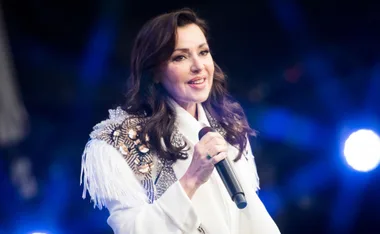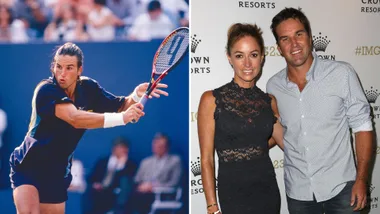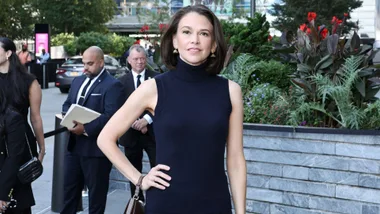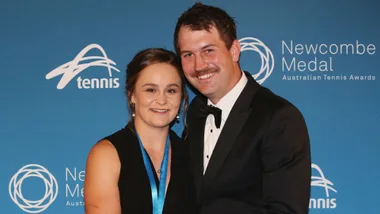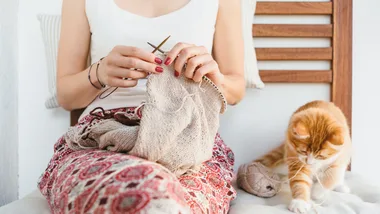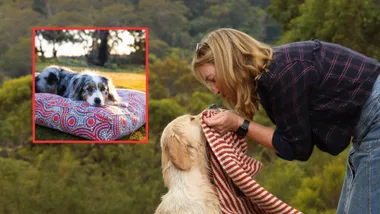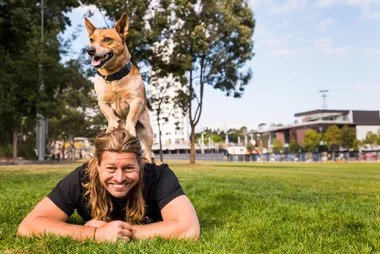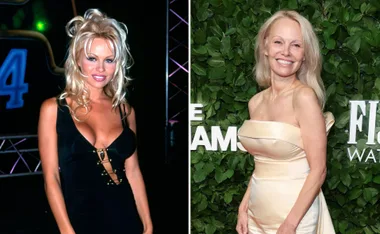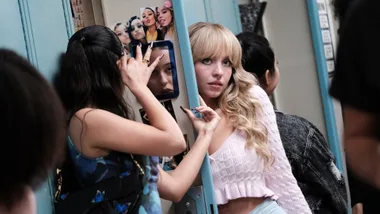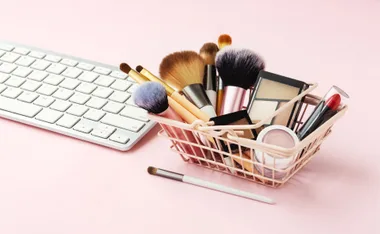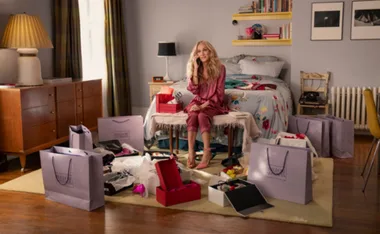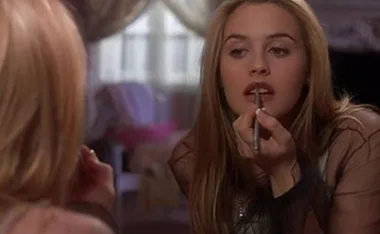An exclusive interview with Gabrielle Lord, Australia’s First Lady of crime and author of Spiking the Girl (Hodder Headline), selected as The Australian Women’s Weekly Great Read for August. Q Your latest book, Spiking The Girl, partly involves an iconic sports star caught up in a big scandal – I assume you wrote it well before the news about the AFL and rugby allegations hit the headlines? A I wrote my book well before that. I think often writers do pick up things a little earlier than other people. I think we’re a bit like the canaries in the mines. It’s an ongoing thing that kind of scandal, it’s been around forever. There’s always the argument, ‘well it was a long time ago and everyone’s getting on with their lives and why stir the hornet’s nest again?’ So I thought I’d have a look at that whole impulse. Q You always say that “research is everything,” so I wondered what road researching Spiking The Girl, took you down? A It took me down a lot of chat room stuff. A lot of the arguments about the net is that 80% of it is devoted to pornography and violence. That’s not surprising when you think that it’s a reflection of what engages people’s minds. I wanted to have a look at that and how it might be impacting on young people, right there, at the front line. Adults are trailing way behind them. They are much more net savvy than we are. And how difficult it must for parents – or grandparents, which is me – to put a block on that stuff just pouring in. One good thing – I hope – is that it’s going to create more honesty in parent child relationships about sex. More open discussion about what a relationship is actually about and the sort of titillation that pornography provides maybe is not the way to go. That’s one positive that comes out. Q It’s extraordinary how vulnerable young people are to these things – were you alarmed at how easy it is access that stuff on the net? A Well…I was aware of it but in a way, it’s no more alarming than the fact that you can walk into a pub and score any drug you want. There are just different dangers. Once there were vagabonds and bandits and highwaymen and things like that and disease. Now we’ve got new plagues I guess. Q Going into pornographic sites, must have been a bit unpleasant? A Well, yes (laughing), I didn’t go too far into it. Then I read about some Brisbane schoolgirls who set up their own porn site. I thought ‘oh, my prophetic soul.’ And how they’d been expelled from their very exclusive ladies college. I guess that wouldn’t go down well with the nuns. Q You could see how it could happen, a couple of bored teenage girls fooling around on the net and the fact that it seems remote because it’s happening in cyber-space. I’m sure it makes them more game? A Yes, I’m sure it does. And the absence of parents at home. In all of those families in the book the fathers are all absent and the mothers also, in a way. I think young people are left so alone that they do find time to do things that are exciting but there’s no parental engagement. Q Is there much difference between teenagers 30 or 40 years ago to teenagers today? A No I don’t think there is much difference myself, that’s just an instinctive answer. What’s becoming more apparent to me as I get older is that the only control a parent has over a child is a strong relationship. And once they’ve lost that, that’s it. They’ll just say f— off mum, at 13. If a relationship’s not in place, they are lost, lost completely so that the possibility of parents being critical is simply going to drive them away. I know adolescents are very awkward people but I think always that relationship must be maintained. And the adults must remember that they are the adult and behave accordingly. Q Did you go off the rails as a teenager? A Oh yes of course I did. I had no relationship with my family though. Q You mean as in not talking, or not having a relationship? A Not having a relationship. Q So you had a wild youth? A I did. I know exactly what tricks you get up to. Q But you survived it admirably well? A Yes, I did! I don’t know about admirably well, but I survived it. Q The private life of Gemma, the P.I., is getting more complicated? A Ooh yes! Isn’t she schtuck now! Q I can’t mention what happens because I think it will spoil the ‘wow’ factor for readers? A Oh good, I think it would spoil it, too. I was hoping for the ‘wow’ response. Q How hard is it to continually grow and develop the one character over a series of books? A It’s hard because I’ve got to remember not to do it too quickly. If I did it in real time she’d probably be about 50. I think Gemma’s going to have to take some sort of anti-ageing pill. Q Was Gemma inspired by anyone in particular or is she a conglomeration with bits of you in her? A A whole conglomeration. Of course there are bits of me in all the characters because where else would they come from? She’s my wild side, I guess, although she’s much more sensible in many ways – I don’t think I could run a business like she does. She’s a composite character, more foolhardy than I am, I think. Q I loved the bit where she had the mobile turned on and her ex could hear her making love to someone else? A Oh my God! Isn’t it a nightmare? Q Where did you conjure up that scenario from? A I read one of those tiny items in The Sydney Morning Herald about a man who knelt on his mobile while he was making love to his girlfriend and dialled his wife who heard the whole thing. And I thought that is so good, I’ve got to use that. I like to use real things. Q I imagine you’re an avid reader of newspapers and magazines? A For story, yes. And I take odd things from police journals and forensic things. I’m always looking for quirky things. Q Do you enter it all into a computer? A No, I just put them in a file, I’ve already got a file called Gemma 4 that’s already starting to collect bits and pieces. Q To write a skilled thriller, other than being creative, you’ve got to be pretty well organised, haven’t you? A I try to be but I’m not. I pretend there’s a thing called creative chaos in which I work but I think it’s actually just chaos (laughing). I seem to work in a mess and it seems to work for me. Eventually it gets pulled together. Q Does that include a messy desk? A Yes, I like to start with a nice clear one, but the rot sets in. Q Spiking The Girl involves the case of the missing schoolgirls that Gemma’s working on, and then there are several other cases, two of which turn out to be linked…it’s complex, how do you keep a track of them? A I’ve tried everything, nothing works except hard work and just thinking around and around and around. Then one day I just get this Eureka! moment and I think oh, of course, that one can link with that one and that’ll work nicely if I do this. But I do put plots on cards and shuffle them around and notes on folded bits of paper…pretty pathetic, really. I haven’t found a writer who has a nice clean way of doing it. You’ve just got to keep slogging away at it. Q Mid-stream of a book are you difficult to live with or be around? A Until quite recently I’ve lived alone for a long, long time. So I don’t know what I’m going to be like. Ask me in another six months. Q I wondered if you become totally immersed in your book? A There’s a really unpleasant time about ¾ of the way through. I liken it to the transition period in labour, where the whole thing is just such a mess and I think it’s never going to work. Somehow it always does. But it’s an awful period and I just have to walk for a few weeks through this. I think I do get very preoccupied with it. I mean, these people talk. They’re real. There’s a whole world that I go and visit when I start moving into the book and they’re very real to me and I see their faces and I hear them talking and they move around. …(laughing) there’s probably a medication you can take for this sort of thing. Q Do you make sure you get outside and do other things as well when you’re writing? A. Oh yes I’m very physical. I walk 5kms every day. I have to, I have a high energy system and if I don’t do that I get very restless. And I do yoga. And Pilates. Q You keep yourself very fit? A Yes if I go down the whole show goes down. All of them, Gemma included. Q Ever imagine that writing would ultimately become a career? A I don’t think I thought much past my first book, really. And now I’m unemployable so I just have to keep at it. Q You must be proud though of your writing achievements? A Yes, very. It’s work that I enjoy very much. I can say some of the things that I want to say. And have fun doing it. The hours are good. There are times where I’ve lived very, very close to the seat of my pants, waiting for a cheque to come in and all of that. It’s not for the faint hearted I don’t think. But for the last few years I’ve had a much more steady pattern with Hodder. Hodder have been wonderful. For the first time in my life I’ve had financial stability. Q Is the Gemma Lincoln series your most popular or successful series? A I think Jack McCain, Death Delights and Lethal Factor, have done very well. I’ve won awards with them and I haven’t with Gemma. My preference is for Jack McCain, mainly because they’re darker and more deadly. Q Describe Gemma, the main character in Spiking The Girl, to someone who hasn’t met her before. A She’s the sort of women who goes very fast to avoid a lot of internal driven-ness. And I think she is starting now to become more aware that she needs to become more aware. I’d say that’s where she is in her character journey and boy, is this latest development going to introduce her to hard reality. I think she’s been a party girl and successful to a degree. Her business is tough. Q She’s tough in many ways, isn’t she? A Yes, she’s a murderer’s daughter. She’s got some interesting scars on her psyche that will give me many hours of harmless pleasure in the years to come. Q Gemma’s developments in Spiking The Girl point to some interesting future plans you have for her – I suppose you have to always have the next book in the back of your mind? A And not murder all the relatives too. I reviewed an Ian Rankin book which was his thirteenth and I wondered why I found it so unsatisfactory and then I realised everyone Revus knew, had died. His family and all his relatives. So the action was a bit distant from him. I think that’s always a problem. You’ve got to keep re-populating – or perish. Q You write good, scary books – have you ever had any scary experiences in your own life? A Oh (laughing), my mother! And I was raised by the nuns, that was pretty scary. Q What, in terms of the nun’s cruelty? A Yes their cruelty and their pleasure hating and life denying. I imagine some of them were very nice but it was not my good fortune to strike that. Yeah, I lived in fear basically and I think that’s where a lot of the fear in my books started. I had a very first hand experience and the fear of a child is very raw. And very, very powerful. Because they can do anything to you and mum and dad are a long way away. Who’s going to save you? Nobody. You’re completely at the mercy of these violent adults. When I think of those Aboriginal children in institutions without anybody my heart just breaks for them. Because I know what was done to me and I was a protected middle-class child. Q Didn’t you tell your parents about what was going on? A No, because they had sent me there. Which made me feel that they were a part of it. There was nowhere to appeal to. Q So this was during primary and secondary or only primary school? A Both. Q Ugh! Sounds like torture! A Yes (laughing), well the sisters at secondary school didn’t do the physical abuse, they just did the psychological torture. It’s very funny now. We had numbers instead of names. Q You didn’t! A We did. I look back at that and think it really was very, very peculiar. It was like a penal institution. I was number 18. (In a far-away voice), you never forget those numbers, it’s funny… Q This was in Catholic boarding schools in Sydney? A Yes. Q I don’t imagine you’re religious? A No, I don’t have any connections to any religious sect or denomination or creed but I have my own strange spirituality. Q You have one daughter and you’re a grandmother? A Yes, I have two beautiful granddaughters, aged 6 and a 3. Snow White and Rose Red. Q Is that what you call them? A No, But I think of them like that because one is very brown-eyed and bonny and the other one’s very fair. Q I hear that you babysit? A I do as much as I can, Carol. I adore them and want to be very much a part of their life. So that means spending as much time as I can. Q So having grandchildren has been a positive experience? A Ooh…wonderful, wonderful! It’s been the most wonderful experience of unconditional love that I’ve ever had. Q What about motherhood? A No, in my case it wasn’t unconditional because I was looking for certain behaviours, certain successes from the child so there was that element of gratification. And what will the neighbours think when she has a tantrum in the middle of K-Mart? They’ll probably think I’m a bad mother. I don’t give a rat’s a— now (laughing) if they have a tantrum, I’m probably down on the floor kicking my heels too! It’s just completely different – you’re freed up. I think it’s to do with being in my late fifties too. Q What star sign are you? A I’m a Piscean. Q One of your interests I’ve read is enlightened psychotherapy – what do you mean by that? A From the bio-energenic field, where it’s body and mind taken as a whole rather than just the mind just treated as a disordered entity in a body. The bio-energenic school follows the thesis that distortions in the mind are reflected in the body. So that a closed mind will have a closed body. The energy flow through they system is cohesive all the way through. So fear and hatred and resentment in the mind will create blocks in the energy flow in the body. I’m very interested in it because I’ve experienced it at a bodily level, so it’s no longer theoretical. It’s overwhelming. Q You are studying it undergoing the therapy? A I did 7 years of therapy which was wonderful and it freed me up tremendously. That’s a huge other long story but I can thoroughly recommend it to anyone. Q Especially to anyone who had a difficult relationship with their mother and was beaten up by the nuns – right? A (Laughing) Exactly! Q I imagine they were your two bogeymen, psychologically? A Well…yes. Lack of support for the child, yes. Q You were an only child? A No I was one of six children but we all were raised like only children. Q Why? A Because we were all sent to different places, schools and boarding schools. Q Where did you come in the six? A I was the boss. Q You were number one child and all the expectations fell on your shoulders? A Yes (laughing) and didn’t I throw them back. And didn’t we have fights? Very character building. Q So there was yourself and..? A One sister and four brothers. Q Are you all closer now? A I’m closer to my sister, but not terribly close to my brothers. Mostly because I didn’t grow up with them. And my sister and I have built a relationship. Thank God for my sister, she’s been a wonderful stalwart. Q Women do that a bit more than men? A Yes, we do. Q You’ve got goldfish? A Mmm… Q How many? A No idea maybe 40, I’ve got a big pond. Q Can you finish the following sentences please? Gabrielle loves…? A Massage (laughing) Q Dislikes? A Rhubarb. Terrible stuff. Q Believes? A In life. Q Are you in a relationship? A Since only very recently, like about last October and it ascended from heaven I think, so it’s a bit new for me as the last man I was involved with it was a very distant relationship, which suited me for a long time. So I’m learning all sorts of things about living together and being together and letting go of some my preciousness. Q Where did you meet him? A I met him at the library. He came to hear me talk because he enjoyed my essays … noone in Australia has read my essays except Borys (spelled with a y not an i) Q So he came up at the end and started a conversation and that was how you met? A Yes. Q I like things happening like that – spontaneously. A Yeah (laughing), they’re nice, aren’t they? I certainly wasn’t expecting it. Q Do you travel much? A I’m going to Indonesia this year on an Asia-Link Scholarship mostly for the Jack McCain series and also because I’m concerned about the hostility towards Islam and Indonesia in Australia and the huge challenge that Indonesia seems to present to Australia. It’s a totally different culture and in terms of our relationship with East Timor, very, very vexed. So I just want to go there and get a feel of the place myself. I’m going for two months and will be based at the university of Jakarta. Q Some of that experience might seep into future books? A Yes I’m starting a new Jack McCain book now and I’m hoping to incorporate an Indonesian element, but it might be too late. Q Do you write one book a year generally. A Yes but I’m always playing with two, writing one, re-writing and proofing another while I’m doing the new one, so they overlap all the time. Q You sound happy. A I’m very, very blessed, I feel.
Newsletter conversion description. Get the latest in your inbox.


